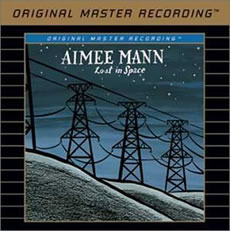|
(30 May 2005) In a career dogged by troubles with major labels who consistently wanted her to be something she wasn't; a vapid, radio-friendly pop girlie icon. Failing to release much of the work she did create, Aimee refused to give in, eventually buying herself out of her contract and setting up her own label with the tongue-in-cheek title of SuperEgo Records. Lost In Space was originally released on Mann's label in 2002. Lost In Space (Mobile Fidelity Sound Laboratories (USA) UDSACD 2021, 2003) is the fourth of Aimee's current tally of five solo albums following her stunning debut Whatever: I'm With Stupid and the critically acclaimed Bachelor No. 2 and coming before this years' The Forgotten Arm -- and you can throw in an Best Song Oscar nomination for "Save Me" on the soundtrack album for the film Magnolia too. This edition was mastered using the GAIN 2 mastering system. The custom analogue tape section utilizes an extremely low induction tape playback head and handmade reproducer electronics, achieving unparalleled resolution and bandwidth up to and beyond 60 kHz. This enables MFSL engineers to extract, with the utmost accuracy, every last musical nuance from the Original Master Recording. The production quality of MFSL's pressing is uniquely superb and a notable improvement from the 2002 release. Lost In Space is not an album that's going to bowl you over on the first couple of plays--and it's no joyride --it's a somber and melancholy experience, and for the most parts lacks the obvious hooks and musical variation that make Whatever such a superb album. The producer of that album and long time Mann associate, Jon Brion is conspicuously absent from this outing. Yet that doesn't make Lost In Space in any way a lesser album,just a different one. There's a unity of superbly articulated subject matter here--desperation, need, sadness, desire, strife, expressed in Aimee's distinctive, even delivery where the subtlest of variation speaks volumes--the slightest break in hervoice tells you more than any amount of the over-wrought vocal histrionics employed by so many current female singers. Lyrically, the album maintains Mann's reputation for intelligent, acute, emotional observation delivered in rapier sharp couplets. For example this from "The Moth" 'and nothing fuels a good flirtation / like need and anger anddesperation.' Actually, she doesn't always need couplets; often a single line will suffice. Perhaps of all her gifts, Mann's melodic ability is her greatest. The tunes here arc and lilt so perfectly that you can't conceive of them ever being anything else but what they are. And even if the hooks aren't as obvious as onher earlier albums, they're there all right - you'll find these tunes coming back to haunt you long after you've taken the disc from the player. In the same way that it's hard for Aimee Mann fans to say exactly which of her albums is their favorite album as they're all so damn fine. So it's invidious to try and pick out specific songs on any album for special praise--and that applies equally to Lost In Space--every track here will have its champion - from the ringing chimes of "This Is How It Goes" to the hypnotic three-time feel of "High On Sunday 51," - from the unsettling feel of "Today'sThe Day" to the melodic wonder of "Pavlov's Bell" with its powerful guitar-washed chorus. In truth, from the first notes of the opening track "Humpty Dumpty" to the sheer beauty and simplicity of the brief closing piece "It's Not," Lost In Space is an album of impeccable songs, exquisitely delivered, with perfectly thought out and executed arrangements - there's not a superfluous instrument in sight. Every solo, every embellishment simply serves to throw the melancholy beauty and pain of the writing into even greater relief. Mobile Fidelity Sound Labs' treatment of Lost In Space is indeed remarkable, especially when compared to the initial release of the album. MFSL's Ultradisc UHR (Ultra High-Resolution SACD Hybrid) pressing is superbly produced and provides better than excellent playback on both today's standard compact disc as well as the new Super Audio Compact Disc format. The accompanying booklet includes additional notes from producer Michael Lockwood as well as co-producer Ryan Freeland. Mann's latest album The Forgotten Arm has just been released.  If ever there was an argument for the fact that the major labels haven't got a clue what they're doing when it actually comes to the music, Aimee Mann is all the proof you'll need. Sublime.--Jamie Field in Hereford, England If ever there was an argument for the fact that the major labels haven't got a clue what they're doing when it actually comes to the music, Aimee Mann is all the proof you'll need. Sublime.--Jamie Field in Hereford, England 
|







